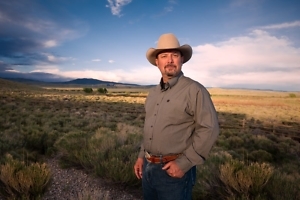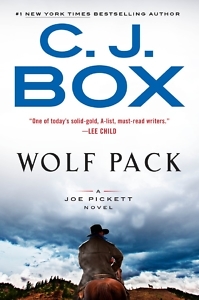Leader of the Pack
Wolf Pack solidifies C.J. Box’s status as one of the nation’s most skilled thriller writers
Wolf Pack is C.J. Box’s nineteenth novel featuring Wyoming game warden Joe Pickett. Somewhere along the way, the Pickett books stopped being merely competent regional fiction—featuring stunning mountain scenery, ample hunting and fishing, and a likeable, cowboyish hero—and became one of the most consistently satisfying thriller series ever written. It’s fitting that Box’s publisher put praise from Lee Child on the cover of the new book, because Joe Pickett now rivals Jack Reacher as a protagonist that loyal readers will follow anywhere.

Except for a short epilogue, Wolf Pack unfolds over the course of eight days in springtime. Each day is a separate section, marked by a black page bearing a literary epigram pertaining to wolves. These quotes come from a surprising array of authors, each somehow fitting for the section that follows: Thomas Jefferson, William Shakespeare, Woodie Guthrie, and Kanye West, to name a few. The first, and most appropriate for the action about to unfold, is from Charlotte Perkins Gilman:
There’s a whining at the threshold—
There’s a scratching at the floor—
To work! To work! In Heaven’s name!
The wolf is at the door!
There are actually two types of wolf at Joe Pickett’s door. The first is a literal wolf, a lone black male who has made brief appearances in previous books. That wolf has now teamed up with three other wolves, evidence that the reintroduction of the species to Yellowstone during the 1990s has led to wolf packs roaming the Wyoming wilderness. The second is figurative and far more deadly: a team of four cartel assassins known as the “Wolf Pack.” They are led by a fearless young woman who is two parts Villanelle in Killing Eve and one part Amara De Escalones in Get Shorty. In other words, she’s ruthless. Early in the novel she and her crew carry out a brutal murder in an upscale Arizona suburb.
 Both packs are still far from the Pickett household as the novel opens. Things have gotten better for the game warden since the last time readers left him. He’s been reinstated after an unjust firing from his job. His family has moved into a new house, built by the state to replace one that burned down. His youngest daughter is preparing to graduate from high school and head off to college, and she’s dating a nice kid who’s recently moved into the area. Pickett’s friend Nate, long a fugitive and loner, has come in from the cold and opened a legitimate falconry business, ridding ranchers of unwanted wildlife. He even appears to be on the verge of marrying and settling down.
Both packs are still far from the Pickett household as the novel opens. Things have gotten better for the game warden since the last time readers left him. He’s been reinstated after an unjust firing from his job. His family has moved into a new house, built by the state to replace one that burned down. His youngest daughter is preparing to graduate from high school and head off to college, and she’s dating a nice kid who’s recently moved into the area. Pickett’s friend Nate, long a fugitive and loner, has come in from the cold and opened a legitimate falconry business, ridding ranchers of unwanted wildlife. He even appears to be on the verge of marrying and settling down.
The only intrigue in Pickett’s life at the moment is that someone has been illegally harassing elk with a drone, and some trapper has laid out what appears to be illegal traps. Using a spotting scope to check the trapper’s trail, Joe spots a feather dangling from a canyon wall:
It twisted slightly in the breeze. A passing bobcat would have to check it out and maybe even take a swat at it. Of course, the leg-hold trap was set in gravel just below it.
It didn’t appear that any animals had been caught and left to die. Joe was grateful for that.
“Yup,” Joe said aloud.
Daisy, the yellow Labrador, lifted her head in response from where she was curled up on the truck seat. She stared at him with unblinking eyes.
“We got us an illegal trapper,” he explained.
After a beat, she lowered her muzzle back between her outstretched paws.
“You could pretend you’re excited, you know.”
Such bucolic peace cannot last long. And of course, this being a Box story, all these seemingly unrelated details and storylines are destined to converge, and in a violent fashion, too: one that involves assassins, drug cartels, various federal agencies, and the beautiful and brutal landscape that serves as backdrop to each book in the series.
Veteran Box readers will expect this inevitable convergence to be both surprising and clever, and they will not be disappointed. Box masterfully weaves his cast of characters, both new and familiar, through a series of events that build suspense with each passing day (and each passing wolf quote). He creates a sort of thriller kabuki: while it may seem formal and stylized in structure, it is inevitably enthralling in presentation.
Late in the book, as the separate storylines wind toward a single violent climax, Nate observes to Joe that things are about to “get western.” When they do, it is not a spoiler to say the good guys win, nor is it a spoiler to say that some losses are suffered. And after the breathless finale, there’s only one question left to ask: When will the next book come out?

Michael Ray Taylor chairs the communication and theatre arts department at Henderson State University in Arkadelphia, Arkansas. He is working on a book about Tennessee caves.


